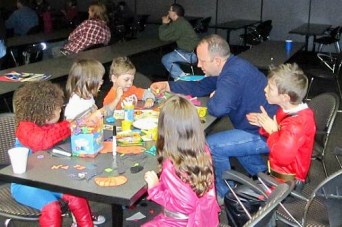Williams Syndrome Program at Nisonger Center Moves into Fifth Year
January 6, 2012

|
| Photo from Holiday Party |
The Williams Syndrome Program at Nisonger Center was established in 2007 and hosts one of eight Williams Syndrome Clinics in the country. The clinical team, including multiple LEND faculty members and trainees, provides comprehensive multidisciplinary evaluations and consultations for approximately 25-30 children/teenagers per year. Initial visits include an exam by a physical therapist, occupational therapist, genetic counselor, and speech-language pathologist. Pediatric fellows from Nationwide Children's Hospital, where the clinic is housed, gain valuable experience in the evaluation and treatment of patients with Williams syndrome. Because of the cardiovascular issues that commonly appear in these patients, adjacency to the Heart Center at NCH is helpful for monitoring blood vessel integrity and high blood pressure issues throughout adolescence. Williams syndrome patients frequently have renal issues that can receive treatment through the hospital, where they place a strong focus on urogenital disease research, or be referred to a specialist in their own locality. The Nisonger team also evaluates and makes recommendations concerning educational and psychosocial issues that often come up in the planning stages of a treatment and lifestyle plan for a child with a developmental disability.
Innovation in research is also one of the goals of the Williams Syndrome Program, with LEND trainees helping develop and assist in multiple projects. Ranging from medical and social to technological needs, typical goals are to investigate the causes of behaviors and explore applications of results and trends discovered in previous studies. Current assignments investigate distinctive brain functions in Williams syndrome patients, novel data tracking methods, and ways to link the unique strengths and challenges of students with Williams syndrome in the classroom with electronic learning resources. Trainees are able to pilot research projects using direct clinical experience and individually report on outcomes in national forums. Former LEND Developmental Behavioral Pediatric Fellow Daisha Seyfer (2011) presented on the use of ADHD medications in Williams syndrome and the use of melatonin in Williams syndrome at recent medical conferences. Researchers continue to look for new environmental and behavioral treatments for anxiety that can complement advancements in drug therapy. The Nisonger Clinic is committed to providing the newest information on psychotropic medicines and Williams syndrome, so that caregivers may have progressive options. Program Director Dr. Marilee Martens says that future research areas are directly related to clinic patients to ensure that the clinic stays productive and user-friendly for families.
Williams Syndrome events, coordinated by the Williams Syndrome Program at Nisonger Center, give children, teens, and adults with Williams syndrome regular opportunities to meet as a group and hone social skills. These events also give LEND trainees a chance to participate in activities with the families. Parents enjoy meeting the graduate student trainees and appreciate the opportunity to share more about Williams syndrome. Organizers put together a program for each event in order to encourage discussion and sharing of information. Parties this year included a screening of the film Embraceable, a documentary about Williams Syndrome, and future plans include having a speaker from BCMH discuss funding opportunities to help parents pay for needed services. This year the Williams Syndrome Program plans to be involved in fundraising during Williams Syndrome Week in May, 2012.
For more information and upcoming research opportunities, please contact Dr. Marlie Martens or visit http://nisonger.osu.edu/williams.







